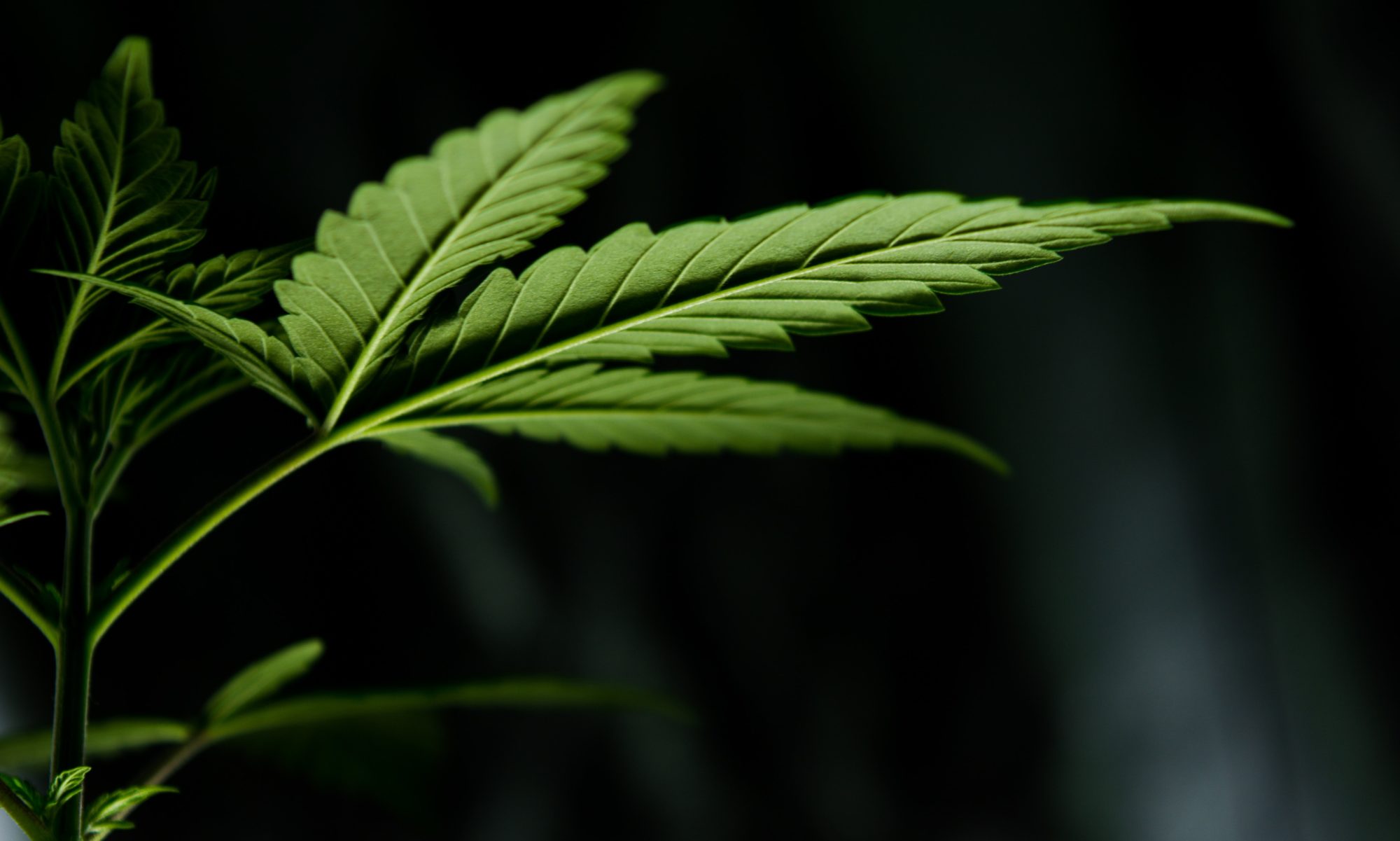
It’s Friday night and I’m at church getting stoned. Around me, congregants of all ages are pulling colorful pipes and carefully rolled joints from their bags and pockets, lighting up and inhaling slowly, with purpose, before passing their paraphernalia down the pew. Dudes in baseball caps mingle with young women in sundresses; retirees rub shoulders with hipsters; a guy in a “Hemp Hustler” T-shirt shimmies down the aisle. When the slender, well-dressed man sitting next to me hands me a blunt, I take a drag. The mood is exuberant, anticipatory—like a party’s getting ready to start.
Entering the rainbow-streaked sanctuary of the International Church of Cannabis—which looms large amid the neat, unassuming rows of houses in this sleepy residential Denver neighborhood—feels like having some kind of religious fever dream, or like visiting the Sistine Chapel on acid. Color literally drips down the walls. Before the church opened its doors to the public on April 20, 2017, Spanish painter Okuda San Miguel spent six days bringing to life a wildly psychedelic vision involving massive creatures with beaks, wings, and sparkling eyeballs. The murals’ creation story reads like a minor miracle: San Miguel didn’t even have a sketch before he started.
Tonight, puffs of smoke float up into the kaleidoscopic ceiling overhead as church cofounder Steve Berke, 37, a former all-American tennis player, ascends to the podium in Converse sneakers. Behind him, two blue plush velvet chairs shaped like hands make a peace sign—and hold joints.
From the evidence in the chapel, it truly is a come-one, come-all creed. Some Elevationists practice other religions, too (Berke himself is Jewish, another of his four cofounders grew up Evangelical). Here, believers don’t have to “convert” to anything; they just have to fill out an online application confirming that yes, cannabis is a “spiritual sacrament” in their life. Why they would bother to do this, and not just get stoned on their own couches at home, is the question I’ve come to answer. According to Lucy, 28, a yoga teacher who sometimes leads classes at the church, “churches by nature have a high vibrational energy. Consuming in a community, in a ‘church’ setting, makes it an even more powerful experience.”
At cannabis church, there are no hymns, no Bible; there’s not even a pastor. (This evening, we’ll hear from two cannabis activists who host a web series called Pot Talk on WorldViral TV.) The house religion is Elevationism, described on the church’s website as the belief (or “lifestance”) that weed can accelerate and deepen a person’s individual spiritual journey, whatever that happens to be.
Through the haze of smoke, I see Berke strike a match and benevolently invite congregants to light joints on his candle. “We support each other on our individual spiritual journeys,” he says, “and come together to burn our sacrament.” At cannabis church, religious rituals are stripped of guilt and recast as a communal self-help experience—which is maybe what they were always supposed to be anyway. The crowd goes wild, shouting “Amen!” and “Huzzah!”
R.E.M.’s 1991 hit “Losing My Religion” turned out to be weirdly prescient: Young people have been turning away from organized belief systems since the early ‘90s, disillusioned by sex scandals and cultures of intolerance. Nearly four in ten young adults now claim no religious affiliation—but that doesn’t mean they’ve stopped seeking spiritual fulfillment. Alternative forms of soul sustenance, from yoga to astrology to socially-conscious jobs, have gone mainstream. Weed, bolstered by a growing acknowledgment of its health benefits and a wave of legalization (recreational use is now legal in 10 states and Washington, D.C.; medical marijuana is legal in more than 30 states), has transcended its reputation as the preferred party drug of slackers and joined the firmament of wellness-based options available to the enlightened young spiritual seeker.
Weed and church are actually not the strangest bedfellows—cannabis has a long religious history. Its active ingredient, THC, interacts with the cannabinoid receptors in the brain, magnifying sensory perception, altering thoughts and feelings, and affecting levels of neurotransmitters like dopamine and norepinephrine, which can lead to sensations of pleasure and euphoria (and sometimes anxiety). Spiritual traditions ranging from Hinduism to Rastafarianism have made use of it; some believe it’s even endorsed in the Bible (“kaneh-bosm,” a key ingredient in Jesus’s anointing oil, may have been an early term for cannabis).
Today’s pot parishioners can already be found all over the country, at the Coachella Valley Church in San Jose, the First Cannabis Church of Florida, the First Cannabis Church of Logic and Reason in Michigan, Greenfaith Ministry in Nunn, Colorado, and the First Church of Cannabis in Indianapolis. Many of these groups meet online or on private property, rather than in actual churches, since they’re limited by local laws about public consumption. The International Church of Cannabis is the rare one where you can actually smoke in the church itself, provided you’re at least 21, show ID at the door, and have completed the aforementioned online questionnaire. (Becoming a “member” is what makes consumption here legal, since the church is a private space.) And you can’t buy or sell on the premises; this is a strictly BYOC situation.
Predictably, on this Friday night in Colorado, I spy a few tourists at the service, and some bros who probably just want the thrill of getting high in a church (Berke says the organization has more than 7,500 official members; about 40 show up regularly). But most seem to be legitimately searching for a sense of community and acceptance that might have been missing from their congregations they grew up in. During the service, people come and go freely, close their eyes and rest, and carry on conversations. Plenty of them approach me to introduce themselves; I can’t tell if they’re proselytizing or just being friendly (or have heard I’m a reporter).
Samantha, 30, a fair-skinned redhead who owns a crochet business called Mile High Stitches, tells me that she moved to Denver from East Texas, “where you’re either Christian or going to hell.” She first visited the church more than a year ago and keeps coming back. “It makes me feel like I’m not alone or lost,” she says. “That there’s a divine purpose to keep pushing forward.” A vivacious white-haired woman named Beth Ann, the self-described “church grandmother,” taps me on the shoulder to inform me that cannabis helped with her Parkinson’s after she moved here from a Florida retirement community (it also saved her marriage, she intimates, motioning toward her husband).
An hour in, the vibe at the church is trending kind of sweat-lodgey. The A.C. is on the fritz, so paper fans wave furiously. One woman reclines sideways on her pew, her legs stretched across her boyfriend’s lap like she’s at an outdoor music festival. As I inhale hot, slightly skunky air, everything fades to a soothing backdrop, warm and hazy and fragrant and safe.
I’m beginning to see the allure of all this: the mix of learning and activism, the inclusive, participatory feel of a house party. The extreme, pervasive chill. Berke, now MCing again, updates the crowd on a court battle the church is engaged in with the city of Denver related to their 2017 opening event, which was unfortunately infiltrated by an undercover cop (whom Berke’s mom accidentally let in at the door without a “membership”).
Some people listen. Others appear to zone out in their pews, deep in their own transformative experience. Lili, 21, an ethereal blonde who grew up in Finland and one of Berke’s interns, tells me later that her first time at the church was almost like a baptism. “I remember sitting on one of the benches alone, after hours, looking around in awe just thinking, I can’t believe I’m here,” she says. Raised atheist, she didn’t know this kind of feeling was possible inside a religious institution. “I’ve always tried to smoke joints in really beautiful places,” she says. “But it’s interesting that you can get that same experience in the city, in a building.”
“It puts things into perspective,” she continues. “Where you are right now, how amazing this is.”
If smoking cannabis can be called a religion, then one can legally smoke cannabis thanks to religious freedom. This is the argument recently made by a man named Bill Levin, who attempted to force the state of Indiana to allow consumption in his weed church on the grounds of the state’s Religious Freedom Restoration Act, which was put in place by Mike Pence in 2015. Last year, a judge dismissed the case. Still, this is one strategy weed churches are using to try to pave the way for increasingly legalized public consumption of marijuana.
Even in a pro-cannabis place like Denver, there’s been resistance. Berke’s legal tussle with the city had, as of press time, resulted in a small fine. But the founders see it as part of a larger fight. Before moving to Colorado, Berke ran for mayor of Miami Beach twice on a pro-cannabis platform, or what he called the “After Party” ticket. (Infamous Trump associate Roger Stone advised one of Berke’s political campaigns, but is not involved in the church.) Oh, and Berke was introduced to weed by Richard Branson, after appearing on the famous Virgin founder’s reality show, The Rebel Billionaire: Branson’s Quest for the Best.
In 2015, Berke founded Bang Digital Media, a company that specializes in marketing and advertising for cannabis companies. That same year, he convinced his parents to buy an old Apostolic church for about a million dollars, planning to turn it into rental apartments or condos. Then he and his cofounders—Lee Molloy, Adam Mutchler, Briley Hale, and Angie Hargot—saw its potential in the battle over bud. “We think the church is a vehicle that can help speed the process along,” he says. “I see how this nonprofit can do more to reform drug policy than any lobbyists out there.”
Berke’s cofounder, Lee Molloy, says the church currently breaks even by fundraising, renting out its space for events, and selling swag at a gift shop on the ground floor. There, amid life-sized Teenage Mutant Ninja Turtles and a floral living room set cased in clear plastic (which formerly belonged, inexplicably, to Olympic snowboarder Shaun White), visitors shop for stuffed toys, souvenirs, and “High Priestess” T-shirts. At the service, a collections bowl circulates, just like in any other church, and parishioners toss in a buck or two to contribute to the new A.C.
There’s a reflexive self-consciousness here, like they know how this looks, a bunch of mostly white seekers in the Mile High City colonizing old churches with their weed. “It’s not like we’re worshipping the plant,” clarifies Samantha. “It’s a tool.” The religious vibe actually encourages people to take their hash habits more seriously. “The spirit of cannabis is a master healer,” explains Elizabeth, 38, the church’s volunteer and events coordinator. “It has the power to bring positive change. But if you abuse it and use it unconsciously, it can take your life force” (not to mention make you mow through a bag of Doritos).
“A lot of people perceive the name and mission as a kind of joke, but it’s not,” says Lili. “I believe it’s the perfect addition to your physical and mental well-being.”
By this time, the speakers have wrapped up, and two 20something guys with guitars—one wearing a grunge-era ski cap, the other in faded denim—are strumming out the first few bars of “About a Girl,” which reverberates through the chapel (those church acoustics, though). Behold tonight’s musical accompaniment: a Nirvana cover band. A couple of young women rush the stage like they’re seeing Kurt Cobain in the flesh. Beth Ann comes dancing down the aisle, gold earrings bouncing. A bunch of us stand up and sway awkwardly in the pews. It all feels a little bit strange, but it’s really no weirder than a recent Catholic funeral I attended, with its ringing bells and chanting and incense and robes. In a way, religion has always been a trip. This version just owns it, and doesn’t ask you to buy into anyone’s story but your own. When the Nirvana set ends, with “All Apologies,” the crowd cheers wildly and demands an encore. It could be the weed, but I realize I’m grinning.
Read The Original Article HERE.

